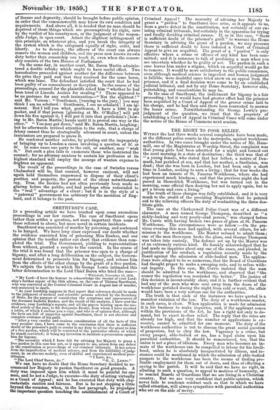• SMETH1JRST'S CASE.
IN a preceding article we have touched upon some anomalous proceedings in our law courts. The case of Smethurst opens rather than settles a question, not more important than some of those referred to above, but more novel in certain incidents.
Smethurst was convicted of murder by poisoning, and sentenced to be hanged. We have long since expressed our doubt whether the evidence convicted him of poisoning Miss Bankes, and our opinion that the verdict rather cut short that evidence than com- pleted the trial. The Government, yielding to representations from without, granted a respite to the convict. In the course of the trial it was found that the prisoner was open to a charge of bigamy, and after a long deliberation on the subject, the Govern- ment determined to prosecute him for bigamy, and release him from the effects of the other charge by the grant of a free pardon. We subjoin the letter in which Sir George Lewis intimated this latter determination to the Lord Chief Baron who tried the case— Whitehall, November 15, 1859. "My Lord—I have the honour to acknowledge the receipt of your Lord- ship's further report of the 18th ultimo, on the case of Thomas Smethurst, who was convicted at the Central Criminal Court in August last of murder, and sentenced to death.
"As your Lordship suggests in that report that reference should be made to the judgment of medical and scientific persons selected by the Secretary of State, for the purpose of considering the symptoms and appearances of the deceased Isabella Bankes, and the result of the analysis, I have sent the evidence, your Lordship's reports, and all the papers bearing upon the me- dical points of the ease, to Sir Benjamin Brodie, from whom I have received a letter, of which I encloseyou a copy, and who is of opinion that, although the facts are full of suspicion against Smethurst, there is not absolute and -complete evidence of his guilt.
"After a very careful and anxious consideration of all the facts of this very peculiar case, I have come to the conclusion that there is sufficient doubt of the prisoner's guilt to render it my duty to advise the grant to him of a free pardon, which will be restricted to the particular offence of which he stands convicted ; it being my intention to institute a prosecution against him for bigamy.
"The necessity which I have felt for advising her Majesty to grant a free pardon in this case has not, as it appears to me, arisen from any defect in the constitution or proceedings of our criminal tribunals. It has arisen from the imperfection of medical science, and from the fallibility of judg- ment, in an obscure malady, even of skilful and experienced medical prac-
titioners. "I have, &c.,
"The Lord Chief Baron, &c." "G. C. ',ENNIS." We can have no doubt that the Home Secretary decided to re- commend her Majesty to pardon Smethurst on good grounds. A duty was imposed upon him which it must be painful for one man' and he not a judge, to execute—the duty of acting virtually as a Court of Appeal ; and he has executed that duty with cha- racteristic caution and fairness. But is he not stepping a little beyond the occasion, when, in the last paragraph, he prejudges the important question touching the establishment of a Court of Criminal Appeal? The necessity of advising her Majesty to grant a " pardon " to Smethurst does arise, as it appears to us, from a grave defect in the constitution, not certainly of our ex- isting criminal tribunals, but certainly in the apparatus for trying and finally deciding criminal causes. If, as in this case, " there is sufficient doubt of the prisoner's guilt" to warrant the Home Secretary in advising the grant of a pardon' we may presume there is sufficient doubt to have induced a Court of Criminal Appeal to give an acquittal. The grant of a "pardon" is only effective where a crime or offence of any kind has been com- mitted; and it is nonsense to talk of pardoning a man when you are uncertain whether he be guilty or not. The pardon in such a ease leaves him under a stigma, which an acquittal would ge, far to remove. It would be more satisfactory to the public conscience, even although medical science is imperfect and human judgment is fallible, were doubtful cases tried anew on an appeal from the prisoner, and if a final decision were come to by an established Judicial tribunal, and not by any Home Secretary, however able, painstaking, and conscientious he may be.
In the case of Smethurst, the indictment for bigamy is a fair proceeding ; but it would have had greater effect had the prisoner been acquitted by a Court of Appeal of the graver crime laid to his charge, and he had then and there been rearrested to answer the lesser crime. Notwithstanding Sir George Lewis's pre- ju ent of the question, we trust that the propriety of esta dishing a Court of Appeal in Criminal Cases will come under the notice of the House of Commons next session.


























 Previous page
Previous page